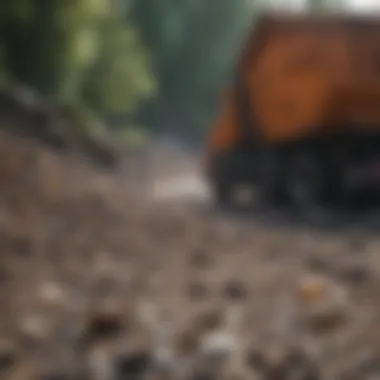The Critical Role of Proper Waste Disposal in Environmental Preservation


Overview of the Topic
Proper waste disposal is a crucial aspect of environmental conservation, significantly impacting ecosystems and human health. In this article, we explore the essential process of bringing garbage to designated dump sites, emphasizing the responsibility individuals hold in ensuring sustainable waste management practices. Understanding the environmental implications of careless waste disposal is paramount in fostering a more conscious approach to handling trash.
Current Status and Challenges
Currently, the world faces a significant challenge in the realm of waste disposal, with overflowing landfills, plastic pollution in oceans, and air pollution from incineration posing serious threats to environmental health. The improper disposal of waste not only harms wildlife but also contaminates water sources and contributes to climate change. Addressing these challenges requires a collective effort towards implementing more efficient waste management systems and raising awareness about the impact of irresponsible waste disposal.
Sustainable Solutions
Exploring sustainable waste disposal practices offers promising solutions to the challenges at hand. From promoting recycling and composting to supporting initiatives for reducing single-use plastics, there are numerous strategies that individuals and communities can adopt to minimize their environmental footprint. By investing in innovative technologies for waste treatment and collaborating with local authorities on waste segregation, we can work towards creating a greener and cleaner environment for future generations.
Impact and Importance
The impact of proper waste disposal extends beyond immediate environmental benefits to long-term sustainability and the well-being of communities worldwide. By adhering to responsible waste management practices, we not only conserve natural resources but also protect biodiversity and prevent pollution. Emphasizing the importance of environmental conservation and sustainable resource use is key to preserving ecosystems and fostering a sustainable future for all. Through concerted conservation efforts and mindful waste disposal, we can pave the way towards a healthier planet for generations to come.
Understanding Waste Management
Waste management is of paramount importance when addressing environmental sustainability. In this article, we dive deep into the intricacies of waste handling, shedding light on its significance in preserving our planet. Understanding Waste Management involves meticulous planning, efficient execution, and constant monitoring to ensure a clean and healthy environment for current and future generations. By exploring the various facets of waste management, we aim to educate and inspire individuals to adopt responsible waste disposal practices.
Defining Waste Disposal
Waste disposal encompasses various types of waste, each requiring specific handling procedures to minimize environmental impact. Types of waste can range from biodegradable organic matter to hazardous materials that demand specialized disposal methods. It's crucial to recognize the uniqueness of each waste type and tailor disposal strategies accordingly to promote ecological balance. The significance of proper disposal cannot be overstated, as it not only maintains cleanliness but also prevents pollution and safeguards public health.
Types of waste
One of the key aspects of waste disposal is categorizing waste into distinct types to facilitate effective management. Understanding the characteristics of each waste type aids in determining suitable disposal techniques, such as recycling, composting, or landfill deposition. By segregating waste correctly, the burden on landfills reduces, promoting sustainability and resource conservation. However, improper handling of different waste categories can lead to environmental degradation and health hazards.
Significance of proper disposal
Proper waste disposal is essential for mitigating environmental risks and promoting sustainable living. Investing in efficient waste management systems helps curb pollution, preserve natural resources, and protect biodiversity. The systematic disposal of waste minimizes landfill usage and encourages recycling, contributing to a cleaner and healthier ecosystem. By emphasizing the significance of proper disposal, we aim to instill a sense of responsibility and stewardship towards the environment.
Environmental Implications
The environmental implications of waste mismanagement are far-reaching, impacting ecosystems and public health. Pollution concerns arise from improper waste disposal practices, leading to water and air contamination, soil degradation, and harmful emissions. Addressing these concerns through sustainable waste handling methods is imperative to safeguard biodiversity and ecological stability.
Pollution concerns
Pollution concerns encompass a range of issues stemming from inadequate waste disposal methods. From plastic pollution in oceans to toxic air pollutants released from incineration, improper waste management poses a significant threat to environmental quality and human well-being. By adopting eco-friendly practices and embracing circular economy principles, we can combat pollution and create a cleaner, safer world for all.
Impact on ecosystems


The impact of improper waste disposal extends beyond visible pollution to encompass ecological disturbances. Disrupting ecosystems through irresponsible waste handling can lead to habitat destruction, species endangerment, and imbalance in natural processes. Conserving ecosystems demands proper waste management strategies that prioritize environmental sustainability and harmonious coexistence with the natural world.
Legal Regulations
Adherence to legal regulations is integral to fostering a culture of responsible waste disposal and environmental stewardship. Laws governing waste disposal establish guidelines for waste handling, storage, and transportation to ensure compliance with environmental standards. Understanding these regulations is vital for businesses, individuals, and public institutions to avoid penalties and promote a culture of legal and ethical waste management.
Laws governing waste disposal
Legal frameworks governing waste disposal set forth requirements for waste classification, treatment, and disposal methods. Compliance with these laws is essential to prevent environmental harm, conserve resources, and protect public health. By adhering to legal regulations, waste generators contribute to a sustainable waste management regime that prioritizes environmental well-being and social responsibility.
Penalties for non-compliance
Non-compliance with waste disposal laws can result in severe penalties, including fines, legal sanctions, and reputational damage. The enforcement of penalties serves as a deterrent to irresponsible waste practices and encourages adherence to legal guidelines. To avoid financial and legal repercussions, individuals and organizations must prioritize compliance with waste disposal regulations to uphold environmental integrity and ethical stewardship.
Essential Steps in Waste Disposal
In this section, we delve into the intricate process of waste disposal, shedding light on the pivotal role it plays in maintaining environmental equilibrium. Proper waste disposal is not merely a task but a responsibility towards conserving our planet's resources and reducing pollution levels significantly. By segregating different types of waste and ensuring they are appropriately disposed of, we pave the way for a cleaner and safer environment for current and future generations.
Segregation of Waste
Organic Waste
Organic waste, comprising biodegradable materials like food scraps and plant waste, holds immense importance in waste disposal practices. Its decomposition process contributes to soil fertility, making it a valuable choice for composting and organic recycling. One key characteristic of organic waste is its ability to break down naturally, reducing the need for chemical intervention. However, its unique feature, decomposition that releases greenhouse gases if not managed properly, necessitates careful handling to maximize its benefits while minimizing environmental impact.
Recyclables
Recyclables form a crucial part of waste disposal, as they can be reprocessed to create new products, reducing the demand for raw materials and energy. The key characteristic of recyclables lies in their adaptability to conversion into various items through recycling processes. Opting to recycle materials offers a sustainable solution that minimizes waste accumulation and promotes resource conservation. While recyclables' unique feature of reducing energy consumption is advantageous, challenges such as contamination and limited recycling infrastructure need addressing to enhance recycling efficiency.
Hazardous Materials
Hazardous materials pose a significant challenge in waste disposal due to their potential threats to human health and the environment. Their key characteristic is the harmful nature that necessitates specialized handling and disposal methods to prevent contamination and pollution. Despite their dangerous nature, hazardous materials play a vital role in industries and households, making proper disposal essential. One unique feature of hazardous materials is their diverse categories, ranging from chemicals to electronic wastes, each requiring specific treatment to mitigate risks effectively. By understanding and managing hazardous waste appropriately, we can mitigate environmental and health hazards, safeguarding ecosystems and human well-being.
Collection Procedures
In the realm of waste management, efficient collection procedures are fundamental to ensure waste is gathered effectively and transported for disposal. Municipal collection services offer organized waste collection schemes that cater to diverse waste streams, promoting community participation in waste management. Their key characteristic lies in their regularity and accessibility, ensuring convenient disposal options for residents. While municipal collection services simplify waste disposal, issues like inconsistent service quality and limited coverage areas may arise, requiring continuous improvement for optimal functionality.
Private waste management services provide customized waste collection and disposal solutions tailored to specific needs, offering flexibility and convenience. Their key characteristic is the personalized approach to waste management, catering to varied requirements based on individual or industrial waste generation. The unique feature of private waste management services is their capacity for specialized handling of waste streams, including hazardous materials or large-scale debris. While private services offer efficiency and customization, cost considerations and regulatory compliance aspects must be prioritized to maintain sustainable waste management practices.
Transportation to Dump Sites
Efficient transportation of waste to dump sites is critical in the waste disposal process to prevent environmental contamination and ensure timely disposal. The role of waste trucks in this journey is paramount, facilitating the movement of collected waste from various sources to designated dumping grounds. Their key characteristic is the capacity to transport large volumes of waste efficiently, streamlining the disposal process. The unique feature of waste trucks lies in their adaptability to varied waste types, accommodating diverse materials for disposal. While waste trucks offer crucial support in waste transportation, challenges like emissions and traffic congestion need mitigation strategies to enhance environmental sustainability.


Safety measures during transport play a crucial role in ensuring the protection of both waste handlers and the general public from potential hazards during waste transportation activities. Their key characteristic is the focus on risk prevention and mitigation, emphasizing the importance of adherence to safety protocols and guidelines. The unique feature of safety measures during transport is the implementation of proactive strategies like personnel training and equipment maintenance to guarantee safe waste transport. While safety measures offer essential protection, factors such as operational costs and regulatory compliance demand continual evaluation to enhance safety practices and minimize potential risks.
The Dumping Process
Proper waste disposal is an integral part of responsible environmental stewardship. The dumping process plays a crucial role in ensuring that waste is managed effectively and does not pose a threat to the ecosystem. By transporting garbage to designated dump sites, we not only maintain cleanliness but also prevent pollution. Furthermore, the dumping process is essential for fostering a culture of waste reduction and recycling within communities.
Dump Site Operations
Site maintenance
In the realm of dump site operations, site maintenance holds paramount importance. It involves regular inspections, repairs, and upkeep of the dump site infrastructure. By ensuring that the site is well-maintained, the risk of environmental contamination is significantly reduced. Site maintenance acts as a preventive measure against leakages and other potential hazards, safeguarding both the environment and public health. Although site maintenance requires ongoing dedication and resources, its long-term benefits in preserving the ecological balance are invaluable.
Health and safety protocols
Health and safety protocols are non-negotiable components of dump site operations. These protocols encompass guidelines and practices aimed at protecting the well-being of workers and the surrounding community. From personal protective equipment requirements to emergency response plans, adherence to health and safety protocols minimizes the risks associated with handling waste. By prioritizing these measures, dump sites can operate efficiently while prioritizing the safety of all individuals involved.
Landfill Management
Layering techniques
Layering techniques in landfill management are systematic approaches to waste disposal that enhance environmental sustainability. By stratifying waste materials based on their composition and biodegradability, these techniques optimize landfill space utilization. The layering process involves compacting and covering waste layers with soil or inert materials to mitigate odors and prevent dispersion of toxins. While layering techniques require meticulous planning and execution, their effectiveness in controlling pollution and promoting landfill longevity cannot be overstated.
Gas extraction systems
Gas extraction systems are instrumental in mitigating the harmful effects of landfill gas emissions. These systems collect and treat gases produced by decomposing waste, reducing greenhouse gas contributions and odors. By harnessing these gases for energy generation or redirecting them away from the environment, gas extraction systems promote sustainable waste management practices. Although the installation and maintenance of these systems entail initial costs, the environmental benefits they yield make them indispensable in landfill management.
Monitoring and Compliance
Environmental assessments
Environmental assessments serve as evaluative tools to gauge the ecological impact of waste disposal activities. Conducted periodically, these assessments identify areas of improvement and effectiveness in landfill operations. By monitoring factors such as leachate levels, soil quality, and vegetation growth, environmental assessments inform decision-making processes for sustainable waste management. Through data-driven insights, dump sites can adapt strategies to minimize their environmental footprint and enhance operational efficiency.
Regulatory checks
Regulatory checks act as checkpoints to ensure compliance with established waste management regulations. These checks verify adherence to prescribed protocols, safety standards, and environmental laws governing landfill operations. By undergoing routine inspections and audits, dump sites demonstrate accountability and transparency in their practices. Regulatory checks not only uphold legal requirements but also instill public confidence in the landfill management process, fostering trust and cooperation among stakeholders.
Community Engagement and Responsibility
Community engagement and responsibility are pivotal aspects of waste management strategies. In this article, we delve into the significance of involving local communities in waste disposal initiatives. Community engagement not only raises awareness but also fosters a sense of responsibility towards environmental conservation. By actively involving residents in waste management practices, we can promote sustainable habits and improve overall waste disposal efficiency.
Educational Initiatives


School Programs
School programs play a crucial role in educating the younger generation about the importance of proper waste disposal. Through interactive workshops and seminars, students learn about the impact of waste on the environment and the significance of recycling. School programs instill values of sustainability and environmental stewardship, shaping future decision-makers towards conscious waste management practices. While school programs offer valuable education, logistical challenges and limited resources can sometimes hinder their effectiveness in reaching a wider audience.
Public Awareness Campaigns
Public awareness campaigns serve as powerful tools to disseminate information about responsible waste disposal practices to a broader audience. Through media platforms and community events, these campaigns raise public consciousness and encourage active participation in waste management initiatives. The key strength of public awareness campaigns lies in their ability to influence widespread behavioral change and instill a sense of environmental responsibility across diverse populations. However, sustaining long-term engagement and measuring the efficacy of such campaigns present ongoing challenges in maximizing their impact.
Individual Accountability
Individual accountability is essential in ensuring the success of waste management efforts. By promoting personal waste reduction strategies, individuals can significantly minimize their environmental footprint and contribute to overall waste reduction goals. Encouraging practices such as composting, reducing single-use plastics, and proper recycling empowers individuals to take ownership of their waste output. While fostering a culture of individual accountability is critical for sustainable waste management, varying levels of awareness and commitment among the general public can pose barriers to widespread adoption of such practices.
Supporting Sustainable Practices
Supporting sustainable practices involves endorsing environmentally friendly behaviors and advocating for greener lifestyle choices. By promoting the use of eco-friendly products, renewable energy sources, and sustainable consumption habits, individuals can actively contribute to environmental conservation efforts. The main advantage of supporting sustainable practices lies in their long-term positive impact on the ecosystem and resource preservation. However, the initial costs associated with adopting sustainable alternatives and the need for continuous education and awareness-building remain challenges in promoting widespread adherence to such practices.
Collaborative Efforts
Collaborative efforts in waste management involve partnerships and collective action towards addressing environmental challenges. Community clean-up drives mobilize local residents to work together in removing waste from public spaces, promoting a cleaner and healthier environment. Such initiatives not only enhance community solidarity but also instill a sense of pride and responsibility towards maintaining cleanliness. Meanwhile, corporate partnerships bring together businesses and environmental organizations to develop innovative waste management solutions and sustainable practices. These collaborations enable the sharing of expertise and resources, leading to impactful environmental initiatives and socially responsible business practices. While collaborative efforts yield significant benefits in terms of collective impact and resource optimization, ensuring long-term commitment and sustaining partnerships over time pose management challenges that require dedicated coordination and strategic planning.
Future Prospects and Innovations
In the realm of waste management, exploring Future Prospects and Innovations is paramount for sustainable progress. This section delves into cutting-edge technologies and approaches that promise to revolutionize waste disposal practices. By embracing Advanced Waste Treatment techniques, we pave the way for a greener future. These innovations not only enhance efficiency but also minimize environmental impact, aligning with the overarching goal of responsible waste management.
Advanced Waste Treatment
Incineration technologies
Incineration technologies represent a pivotal aspect of modern waste treatment. The incineration process involves the combustion of waste at high temperatures, reducing it to ash. This method not only reduces the volume of waste but also generates energy through controlled burning. The key characteristic of incineration technologies lies in their ability to convert waste into useful resources while mitigating space constraints in landfills. Despite its advantages in energy recovery and volume reduction, critics argue about air pollution and potential emissions of harmful byproducts.
Resource recovery methods
Resource recovery methods play a crucial role in extracting value from waste streams. These approaches focus on recovering raw materials or energy from waste that would otherwise end up in landfills. By utilizing advanced sorting and processing techniques, resource recovery maximizes the utilization of resources and minimizes environmental impact. A key characteristic of resource recovery is its emphasis on sustainability and circular economy principles. While resource recovery offers significant environmental benefits, challenges such as technological complexity and economic viability need to be addressed for widespread adoption.
Smart Waste Solutions
In the digital era, Smart Waste Solutions leverage cutting-edge technology to optimize waste management processes. By integrating IoT applications, waste management systems gain real-time data insights, improving operational efficiency and decision-making. IoT applications enable remote monitoring, predictive maintenance, and data-driven optimization, making waste management more streamlined and effective. The unique feature of IoT applications lies in their ability to transform traditional waste management into a data-rich and interconnected ecosystem. While IoT applications offer multiple benefits in terms of efficiency and cost-effectiveness, concerns regarding data security and infrastructure compatibility should be addressed.
Data-driven waste management
Data-driven waste management harnesses the power of analytics to drive informed decision-making in waste disposal practices. By analyzing large datasets, waste management authorities can identify trends, optimize collection routes, and minimize environmental impact. The key characteristic of data-driven waste management is its emphasis on evidence-based strategies that enhance resource allocation and operational efficiency. The unique feature of this approach is its ability to adapt to dynamic waste management challenges through continuous data analysis. While data-driven waste management offers significant potential in enhancing waste management practices, issues related to data privacy and data quality need to be carefully managed.
Circular Economy Principles
Embracing Circular Economy Principles is fundamental in reshaping our approach to waste management. By implementing closed-loop systems, we aim to eliminate waste and promote resource circulation within the economy. Closed-loop systems prioritize recycling, remanufacturing, and waste reduction, fostering a sustainable and circular supply chain. The key characteristic of closed-loop systems is their focus on creating a self-sustaining ecosystem where waste serves as a valuable resource. While closed-loop systems hold promise in reducing reliance on finite resources and minimizing environmental impact, challenges related to infrastructure development and consumer behavior pose implementation hurdles.
Waste-to-energy strategies
Waste-to-energy strategies present a promising avenue for converting waste into renewable energy sources. By incinerating waste to generate electricity or heat, waste-to-energy strategies address both waste management and energy needs. The key characteristic of waste-to-energy strategies lies in their dual benefits of waste reduction and energy production, contributing to a more sustainable energy mix. The unique feature of these strategies is their potential to reduce greenhouse gas emissions and reliance on fossil fuels. While waste-to-energy strategies offer significant environmental advantages, concerns regarding emissions control and public acceptance need to be carefully evaluated.



